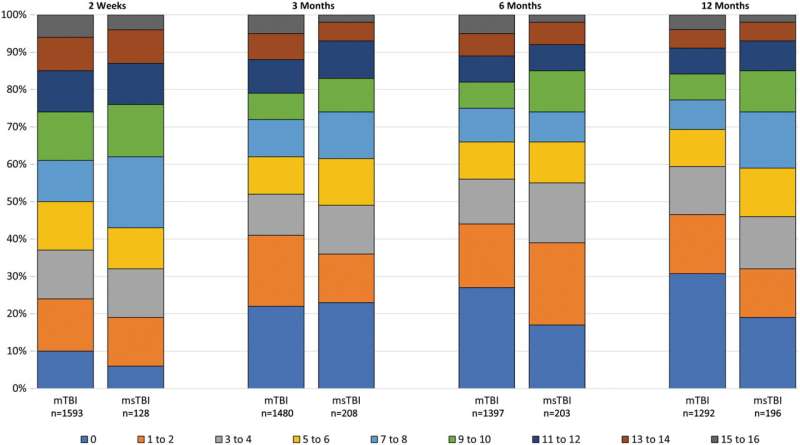Symptom persistence during first year following traumatic brain injury

More than 70% of patients with traumatic brain injury (TBI) reported at least one problematic symptom at one year of follow-up that was new or worse than before injury. Half of patients reported three or more such symptoms after a year, according to a study published in the Journal of Neurotrauma.
Joan Machamer, from the University of Washington, Harborview Medical Center, and colleagues representing the TRACK-TBI Investigators, compared the frequency and persistence of symptoms in patients with TBI to two control groups: patients with orthopedic trauma and friend controls. The groups were evaluated at two weeks, and three, six and 12 months post-injury.
The investigators found the physical symptoms such as headache, fatigue, and dizziness tended to occur earlier, with cognitive symptoms predominating later. Physical symptoms declined more markedly over time, whereas cognitive symptoms were more constant over time.
"Clinicians should inquire about symptoms in patients who have had a TBI, reassure them that experiencing symptoms is common, and direct them to seek treatment for symptoms that are disrupting their lives," said the investigators.
"This study is remarkable for several reasons," says David L. Brody, MD, Ph.D., editor-in-chief of Journal of Neurotrauma. "First, it is among the largest studies of its type, with over 2,000 participants. Second, it confirms what many of us who practice brain injury medicine have observed for many years– a wide variety of symptoms can be very persistent and very troubling to our patients even after so-called 'mild' TBI. Third, the investigators used the right controls; people with orthopedic injury as well as friends of the patients with TBI. Symptoms in patients with TBI were substantially more common and more severe than in both control groups."
More information: Joan Machamer et al, Symptom Frequency and Persistence in the First Year after Traumatic Brain Injury: A TRACK-TBI Study, Journal of Neurotrauma (2022). DOI: 10.1089/neu.2021.0348


















